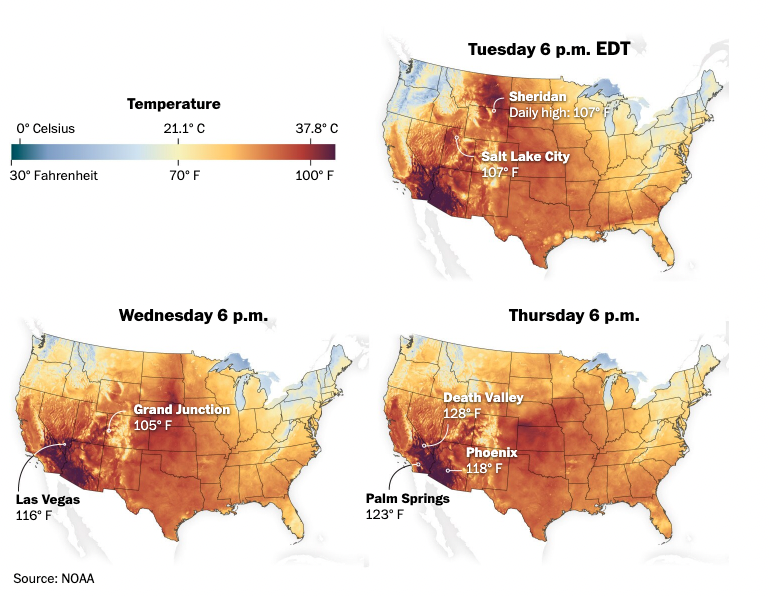
On June 19, 1865 — two months after the Civil War had ended — more than 250,000 enslaved people in Texas were freed.
The newly emancipated responded with cries of joy and prayers of gratitude, a celebration that became known as Juneteenth. washingtonpost.com/history/intera…
The newly emancipated responded with cries of joy and prayers of gratitude, a celebration that became known as Juneteenth. washingtonpost.com/history/intera…
Black Texans marked Juneteenth each year with parades and picnics, music and fine clothes. wapo.st/3iQsFI2 







The Juneteenth gatherings grew through the aborted promise of Reconstruction, through racial terror and Jim Crow, and through the Great Depression, with a major revival in the 1980s and 1990s. wapo.st/3iQsFI2 







Listen to the drumline at the 2017 Iowa City Juneteenth Celebration: wapo.st/3iQsFI2
But why celebrate nationally something that happened in a single state?
As Black Texans moved across the U.S., they brought their day of jubilation with them. Embracing that day has become a fitting way to mark the end of a war fought to preserve slavery. washingtonpost.com/history/intera…
As Black Texans moved across the U.S., they brought their day of jubilation with them. Embracing that day has become a fitting way to mark the end of a war fought to preserve slavery. washingtonpost.com/history/intera…
At the start of the Civil War, these states still had legalized slavery. Some were border states that remained loyal to the Union. In New Jersey, a gradual abolition law passed in 1804 — so gradual that the 1860 U.S. Census counted 18 people as “slaves.” wapo.st/3iQsFI2 

Congress abolished slavery in the District of Columbia on April 16, 1862. Nine months later, on Jan. 1, 1863, Lincoln declared enslaved people in the Confederacy forever free — though slavery remained in effect on the ground. wapo.st/3iQsFI2 

Enforcement of the Emancipation Proclamation generally followed battle lines, encompassing all of the Confederacy except Texas by the end of the war.
Four states abolished slavery before the end of the war: Maryland, Missouri, the new state of West Virginia and Tennessee.
Four states abolished slavery before the end of the war: Maryland, Missouri, the new state of West Virginia and Tennessee.

Juneteenth: On June 19, 1865, in Galveston, Tex., Granger issued General Order No. 3, freeing all enslaved people in Texas, in accordance with the Emancipation Proclamation issued two and a half years earlier. wapo.st/3iQsFI2 

The 13th Amendment banning slavery was officially proclaimed on Dec. 18, 1865, after enough states had ratified it on Dec. 6. By then, the only enslaved people waiting to be freed were in Delaware, Kentucky and New Jersey. wapo.st/3iQsFI2 

In early Juneteenth celebrations, freed men and women were invited to recount the horrors of slavery and the sweetness of freedom.
“This was partying with purpose — not only for the people to join the celebration but to learn directly from the past.” washingtonpost.com/history/2020/0…
“This was partying with purpose — not only for the people to join the celebration but to learn directly from the past.” washingtonpost.com/history/2020/0…
Juneteenth has taken on a symbolic national reverence as the day news of the Emancipation Proclamation finally reached Texas, but, in reality, the Emancipation Proclamation didn’t end slavery, and neither did the Civil War.
Here are 3 myths about its history.
Here are 3 myths about its history.
Last summer, amid the racial-justice protests following the murder of George Floyd, millions of White Americans became aware of Juneteenth for the first time.
On Thursday, President Biden signed the bill to make Juneteenth a federal holiday. washingtonpost.com/history/intera…
On Thursday, President Biden signed the bill to make Juneteenth a federal holiday. washingtonpost.com/history/intera…
• • •
Missing some Tweet in this thread? You can try to
force a refresh









